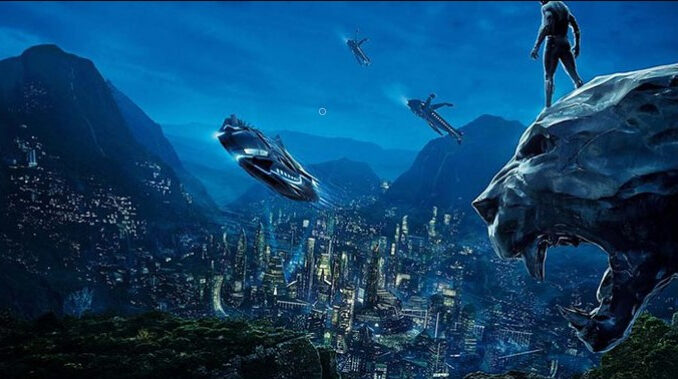
Emily Fritz | Staff Writer
Nov. 17, 2022
The fourth phase in Marvel’s Cinematic Universe (MCU) draws to a close with their newest film, “Black Panther: Wakanda Forever.” The first film in the “Black Panther” adaptation debuted in 2018, starring the late Chadwick Boseman. The star lost a long, private battle with colon cancer in August 2020.
Instead of recasting the late star’s role in the film, director Ryan Coogler, alongside co-writer Joe Robert Cole, chose to instead rewrite much of the sequel script. Consequently, the title of Black Panther fell to the next-of-kin in Wakanda, Shuri (Letitia Wright).
The whole film pays tribute to Boseman, beginning with the opening scene, where an absent T’Challa (Boseman) is explained to have an illness that has progressed to the terminal stage. From his death, Marvel brings their characters and their audience an opportunity to connect and to grieve.
From this point, Wright’s character takes the spotlight, and successfully explores themes such as grief of a premature death, social and traditional disconnection, abandonment and coming of age.
These themes are reminiscent of those done in the last two installations of the Spiderman movies, as well as “WandaVision” and the most-recent Dr. Strange movie. However, the depth of the loss that this film describes takes on a more powerful role, as they conflate Boseman with his character.
In addition to the interpersonal and introspective conflicts that Wright’s character faces, she is challenged by a new enemy: Namor (José Tenoch Huerta Mejía), the feathered serpent god and his underwater kingdom of Talokan.
Along with Talokan’s introduction into the MCU come its Mesoamerican influences. Serving as a foil to Wakanda, “Black Panther: Wakanda Forever” explores the recurring theme of colonialism, as it did in the first movie.
The similarities between Talokan and Wakanda falsely lead viewers into a sense of security, as Shuri and Namor show great empathy toward each other and their respective plights.
It also becomes very clear early on that Wakanda is at a disadvantage in technology, as Talokan is an underwater civilization and they also utilize vibranium, which was one of Wakanda’s only advantages against outsiders. Conflict could prove to be devastating, if not fatal for the Wakandans.
The “Black Panther” adaptations have stood out against other Marvel films. The 2018 film was the first to feature a Black superhero as the main character. The movie received much love from fans about the cultural influences and authenticity that went along with the non-white focus.
“Black Panther: Wakanda Forever” continues with these cultural influences. Although Wakanda itself is fictional, the influences are still critically acclaimed and well received by audiences.
Because of these heavy influences, the emphasis shifts from the individual to that of the community. There are many side characters to keep track of in the movie, some returning from the first movie and others newly introduced.
In addition, the warrior group in Wakanda, the Dora Milaje, is an all-women group. Without Boseman’s presence, this feminine emphasis becomes clearer.
T’Challa’s mother, Ramonda (Angela Bassett), takes the throne again, giving Wakanda the first matriarch that viewers have seen thus far, and his sister Shuri takes over the role of the Black Panther. Writers have also hinted to the next-generation Iron Man: Riri Williams (Dominique Thorne) who takes on the part of Ironheart.
While T’Challa’s original role as Black Panther was seen as noble, humble and level-headed, Shuri brings more genius, spunk and angst with her to the long legacy. Her feelings are valid, as she is continually met with a new heartbreak or loss, but toward the end of the movie, she begins to take her want for revenge too far.
The script allows Shuri to grow into her own, while respectfully laying to rest what Boseman had set up for the character of T’Challa as the Black Panther.
Without spoiling any aspects of the movie, “Black Panther: Wakanda Forever” is worth watching. Be forewarned that the run time of the movie is 2 hours and 41 minutes. While parts of the movie do feel drawn-out, the writers were justified in their goals.
They wanted to honor Chadwick Boseman, while giving the characters and audience a chance to mourn, connect and move forward. There is significant substance to the main and sub plots of the movie, which justify the well-deserved ending.
It almost goes without saying, but stick around for a post-credit scene, and bring tissues.
